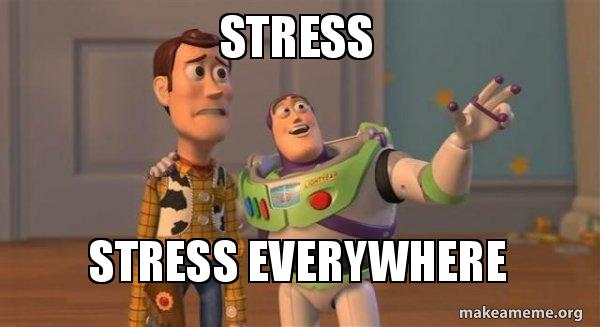
Stress, the ever-present reaction to pressure that we unfortunately cannot completely eliminate from our lives, impacts us mentally and physically and in more ways than we can imagine, short-term and long-term. Though we cannot completely avoid it, we can learn to manage it by making simple life changes or making time for healthy stress-reducing habits.
The stress that Covid-19 caused in society was overwhelming as it transformed our daily lives, impacted work environments, relationships, and our general health. Adjusting to life post-pandemic is arguably just as stressful as we transition back into working on-site, studying on-campus, socialising more, and making all the other necessary adjustments.
As young professionals, we are all too familiar with stress and how it impacts our lives. This is why we believe it is important to explore the topic of stress and how to manage it, especially in a world that is constantly providing us with unimaginable challenges on top of every-day life.
As much as we try to avoid the overwhelming feelings that stress causes, our daily tasks, professions, workplaces and other responsibilities inevitably morph into stressors, affecting our bodies in a multitude of ways.
If you often hear about stress management and wonder how you can possibly make time to de-stress in the midst of deadlines or an abundance of tasks for the day, we can certainly relate, having experienced these feelings, but we’re here to make it simple.
Sometimes the issue is that we believe the only way to relieve our stress is to tackle the direct problems, whether it means working tirelessly without breaks to complete an assignment, completing errand after errand, or doing everything you can to meet a work deadline, disregarding your body’s needs. This means that we end up forgetting that doing little things that promote relaxation, calm our minds, and ease our bodies, actually aid the process towards achieving our daily goals, bringing us closer to completion and thereby, easing stress as it stimulates our brains and improves our overall health.
1. Take your time
Firstly, taking time away from what is pressing and causing the stress, to walk outside and get some fresh air, light a candle for relaxation, or talk to a friend or family member to therapeutically relieve frustration, are simple ways to help you feel relaxed, energized, and ready to take on what lies ahead.
2. Remember to breathe
Putting some time aside in between tasks to engage in deep breathing techniques is also a great method for relieving some stress. Deep breathing techniques are often undermined, but have been proven over a number of studies to significantly reduce stress. In a study carried out by the University of Arizona, breathing meditation was proven to significantly reduce the stress of participants after having experienced a stress-inducing situation, with the effectiveness being even more apparent when measured three months later (Harvard Business Review, 2020).
3. Avoid snack attacks
Another tip to consider is avoiding the tempting urge to continuously snack on unhealthy foods while working, studying, or trying to get through your day. Though this can be difficult, you may often find that these habits only end up making you feel worse. Eating a well-balanced diet, rather than falling into the trap of eating unhealthy snacks that boost your feelings only momentarily, can significantly boost your mood and brain power, increasing your drive, motivation, and ability to think clearly. Opting for wellness shots on their own or with a 100% pure fruit juice beverage for a longer lasting refreshment, rather than a soft drink or chips, will go a long way in stimulating brain power and providing long-lasting energy.
4. Social media. Need we say more?
Social media can be the ultimate stress inducer. Aside from the robbing you of joy through comparing yourself to facetuned faces and filtered lives, it's a black hole of time sucktion helping to procrastinate work or engage in activites that are going to destress and fulill you.
If you are regularly finding yourself getting distracted through looking at social media for hours and thereby, increasing your stress levels as a result of the time-wasting habit, work towards developing healthier habits of doing something else that aids your body and consequently, aids your mind. We recommend time-limits either only allowing yourself to scroll for 20minute periods, 2-3 times a day and schedule them in. You can also replace the desire to procrastinate with unhelpful activities, and instead procrastinate in more beneficial ways through engaging in a workout, some yoga, or by making yourself a healthy brain-stimulating smoothie, such as one using our charge shot, providing energy and promoting concentration through a megadose of vitamins and antioxidants.
5. Whistle as you clean
Lastly, never underestimate how much the effect of a clean or tidy environment can actually help your mind to declutter. Often stress prevents us from being able to do little things that may actually aid our stress levels, as our brain convinces us that the few minutes spent making our bed, cleaning our rooms, putting dishes in the sink and out of sight, are minutes wasted that could instead be spent on the pressing issues at hand. Though this is understandable, these acts can actually help us to be more productive. Decluttering your workspace will also declutter your mind and organising your workspace can help you to gather your thoughts.
Final thoughts...
Overall, we are aware that stress is not something that can be easily removed from daily-life, but we hope these simple tips and suggestions can help you to develop healthy and beneficial habits and maybe get some
Reference List:
Seppala, E., Bradley, C., & Goldstein, M.R. (2020). Research: Why Breathing Is So Effective at Reducing Stress. Harvard Business Review. https://hbr.org/2020/09/research-why-breathing-is-so-effective-at-reducing-stress

